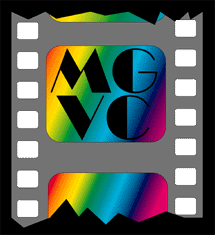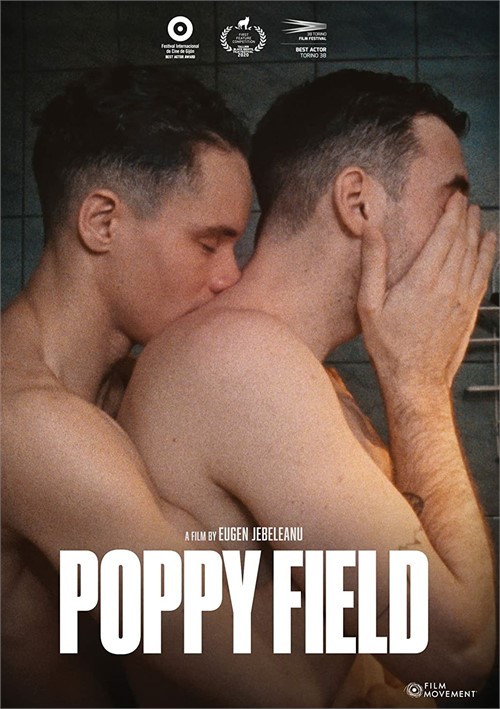(2020, 107 min)
Country: Romania
Director: Eugen Jebeleanu
Studio: Film Movement
Language: Romanian w/subtitles
SYNOPSIS: Planning to spend a romantic weekend with his long-distance boyfriend, Christi's tender reunion is cut short when he is called in to handle a crisis at work. Christi is a member of the Bucharest police , and his unit is sent to quell a protest at a local movie theater, where a far-right group has interrupted the screening of a queer film.
As tensions between the homophobic protesters and the audience mount, Christi, closeted to his fellow officers, begins to spiral out of control when he spots a former fling in the crowd. A violent outburst threatens to expose Christi's secret and s him to confront the contradictions between his personal and professional life.
Inspired by true events, Poppy Field "reveals aspects of the wider damage done by prejudice that are rarely seen onscreen" (Eye for Film) and is a "worthy entry into the Romanian New Wave" (Art House Street).
REVIEW:
A young gay police officer who’s worked hard to keep his sexuality hidden must face his inner demons when he’s forced to intervene during an anti-gay protest at a Bucharest movie theater. Trapped in the macho, rigidly hierarchical world of the Romanian police force and confronted by a young protester who threatens to expose him, he suddenly finds himself spiraling out of control.
In “Poppy Field,” veteran theater director Eugen Jebeleanu makes his feature-film debut with a story inspired by real-life events in Romania. Produced by Velvet Moraru of Bucharest-based Icon Production, the film stars Conrad Mericoffer as the conflicted policeman, with acclaimed Romanian New Wave cinematographer Marius Panduru (“Aferim!”) handling the camera.
“Poppy Field” had its world premiere last fall in the Tallinn Black Nights Film Festival. Ahead of its Romanian premiere at the Transilvania Intl. Film Festival, Jebeleanu spoke to Variety about the experience of switching from stage to screen and why it’s important to keep telling LGBTQ stories.
“Poppy Field” was inspired by a real-life protest inside a Bucharest cinema. Can you tell me about that incident?
The first time was in 2013. A film that was interrupted by a group of Christian, Orthodox activists. It was the film “The Kids Are All Right.” That was the first time, and it was a big surprise – they came with a lot of Romanian flags and [religious] icons and they were singing the national anthem. That was shocking, but it was like “Okay, it happened once.” We thought it was just that. But after, they repeated these kinds of actions. Even in 2018 for [Robin Campillo’s AIDS drama] “120 Beats per Minute.” I thought it was crazy that they’re not stopping this. So Ioana [Moraru], the screenwriter, wanted to write a story inspired by this event, and putting a homosexual police officer in this story to see how it would be to make this connection between someone who is troubled by his professional life and his personal secret. Everything started from her, and then I received an invitation from her and the producer to make this film.
Was it a big change switching to the screen?
I was really interested [in this film] because I’m a theater director who’s working a lot with this topic. Even if it was the first time that I was working in cinema, and I was a bit afraid in the beginning because I didn’t know if I would manage, I think it’s important to tell these stories. I had this great luck to work with Marius [Panduru] and with a very good team. I was a bit afraid at the beginning, but my producer, Velvet Moraru, she was really invested in what we were doing. She said she wanted to put a good crew around me for me to work with confidence.
I haven’t changed a lot from my way of working in the theater. Marius told me not to change anything that I’m doing, just to be aware that the camera is all around, like an audience, 360 degrees. I rehearsed a lot, like four months before the shooting. I felt like I’m working in theater, of course with other tools, but at the same time not very different from my way of directing the actors.
There’s a striking scene in the film where Cristi is standing alone on the stage inside the theater. Did you want to stress how he’s “performing” different roles in his work life and his relationship? Or are we all performing our identities in some way?
You’re right to see all these things. For me, it was important to tell this story not about putting people into bad or good characters but trying to see how he’s [wearing] masks and [projecting different] representations in society. How he is with his friends, how he is at home, how he is with other people – all these roles. It’s something that was nice for me working in the cinema hall, because it gave something theatrical to all of this. I wanted him to be alone in the cinema hall, thinking about his loneliness and his fears and all his struggles.
There have been several LGBTQ-themed films to come out of Romania in recent years, such as Ivana Mladenovic’s “Soldier. Story from Ferenati” and Bogdan Theodor Olteanu’s “Several Conversations About a Very Tall Girl.” How would you describe the climate for both queer filmmakers and their stories in Romania?
I think it’s a bit better because we have done these films, but it’s not enough. For me, it’s just the beginning of telling these kinds of stories. I hope there will be more and more stories like this without having this impression of making something like a manifesto. I think these [same-sex] love stories could be a non-topic. I hope one day it will become something like this.
For the moment, we still make films on these topics because we have to fight for something. We still have to fight for rights for the LGBTQ community. It’s just the beginning. I was really surprised that we received funds from the National Center of Cinematography, because I think there are still a lot of people that are against [LGBTQ rights] and have a lot of distance from this kind of topic. It’s not with the idea of our religious education here in Romania. It’s the beginning. But it’s already good that it starts. It’s changing, but step by step.
Did you enjoy working with a new medium?
I really loved this experience, because it was something for me, as I’m coming from theater, that was so different in the way of production. But I liked it a lot and I want to continue. I want to also start to make projects that bring together theater and cinema – maybe start to make something more fluid between these two media. I will make another film with this same crew, with Ioana Moraru, the screenwriter, and this production team. I hope to make it in the next year. I have other ideas for continuing to make cinema. I’m someone who’s searching a lot. I think there are stories that I can tell better in theater, and other stories that I can tell better in cinema.
-- Review by Christopher Vourlias, Variety (http://www.variety.com)




